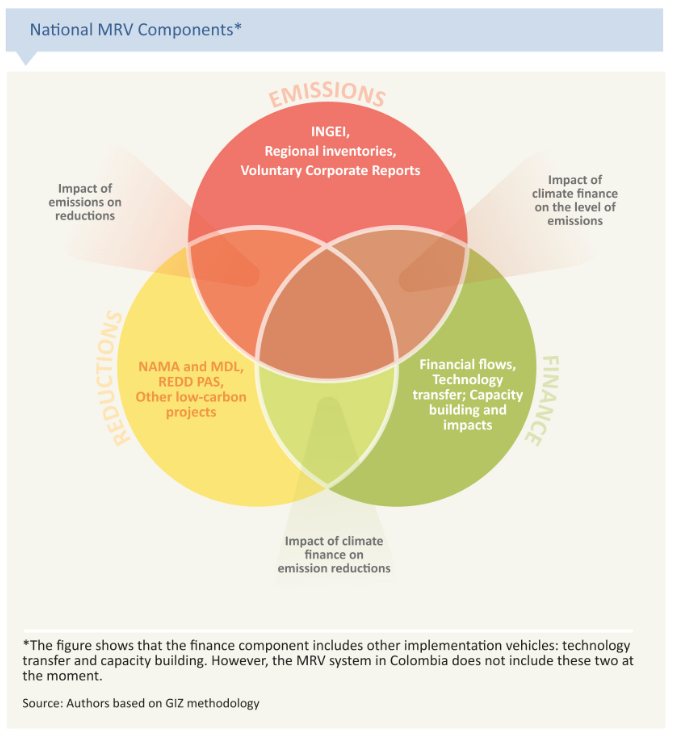The system to measure (M), report (R), and verify (V) the flows of climate finance in Colombia aims to collect information that is currently dispersed over numerous portals and reports into one easily searchable platform. The definitions of measurement, reporting, and verification are:
Measurement: the result of estimating the financial resources allocated, received, and mobilized for climate change mitigation and adaptation actions from a variety of financial sources (i.e. public and private, national and international).
Report: the result of presenting the information of financial resources provided and mobilized such as amounts, source, use, etc. Reports can be prepared by various actors and distributed through various means, such as websites, official reports, etc.
Verification: the result of assessing whether the climate finance information is correct and accurate. Verification can help evaluate the effectiveness and efficiency of climate finance.
The M is often used interchangeably to mean measurement and monitoring, without an agreement on the difference between the two concepts. For the Standing Committee on Finance (SCF) of the United Nations Framework Convention on Climate Change (UNFCCC) and other bodies in the field of climate finance, the M in MRV represents the measurement, while monitoring is the constant action that is performed throughout the life cycle of the MRV system.

The creation of a Climate Finance MRV System was one of the commitments made by Colombia to the UNFCCC as part of its nationally determined contributions (NDCs) to deal with climate change. The system is a tool of the
Financial Management Committee (CGF) of the National Climate Change System or SISCLIMA, whose objective is to generate policy recommendations to secure sustainable and scalable climate finance.
The system is one of the components of the National MRV System. The other components are: the National Register for the reduction of GHG emissions (MRV of reductions) and the Inventory of GHG emissions (MRV of emissions). The development of these components is overseen by the
Ministry of the Environment and Sustainable Development and the
Institute of Hydrology, Meteorology and Environmental Studies (IDEAM), respectively.

Objectives and importance of the Climate Finance MRV System in Colombia
The Climate Finance MRV in Colombia aims to:
Increase the effectiveness of climate finance through an information tool that improves the understanding of the financial flows to mitigate and adapt to climate change, from public, private, national, and international sources; helps manage climate finance; and helps identify investment gaps to tackle the climate change problem.
Its specific objectives include:
To compile and consolidate climate finance information.
To identify gaps and funding opportunities that promote a more efficient use of resources and improve the decision-making process for climate finance.
To present the trends and evolution of climate finance.
To facilitate access to information through a digital and user-friendly platform.
To facilitate a greater understanding of the source and use of climate finance.
Although the MRV of finance was initially intended mainly for developed countries (to clarify how resources were being distributed to developing nations), developing countries are now also encouraged to create MRV systems. This is particularly true for those countries, like Colombia, that are both recipients and providers of finance. The Climate Finance MRV System in Colombia is important because it can help achieve goals that are significant both at the international and national level.